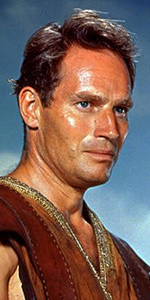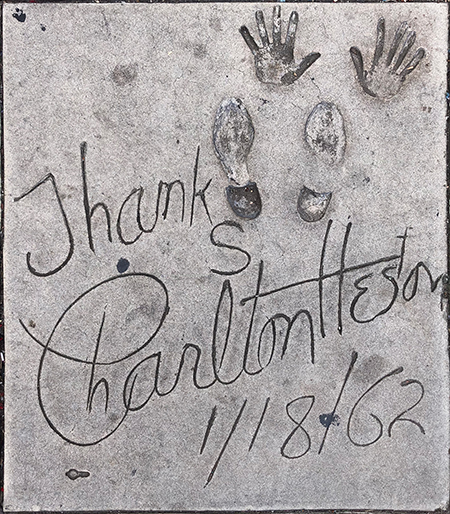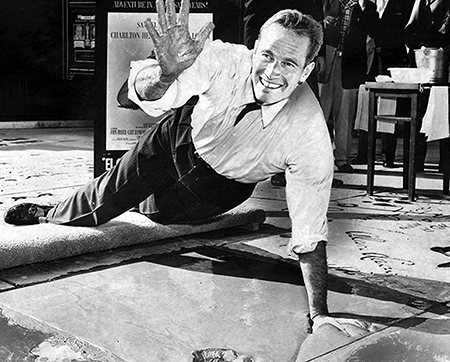 |
 |
 |
 |
 |
| Charlton Heston as Juda Ben-Hur, released in November, 1959. |
| |
|
 |
|
 |
| |
 |
| |
 |
| |
|
|
| Charlton Heston |
 |
| Forecourt Ceremony held on Thursday, January 18, 1962 |
| |
Born: John Charles Carter, October 4, 1923, in Wilmette, Illinois
Age at the time of the ceremony: 38
Died:
April 5, 2008, in Beverly Hills, California, age 84
|
| |
Charlton Heston was one of Hollywood's sure-fire box-office draws from the 1950s to the 1970s. Heston willingly undertook playing larger than life characters, and, in a way, became one himself.
Born in confortable circumstances, Heston's father was a sawmill owner; his mother's family name was Charlton; they had arrived in America from England in the 1600s. The family began calling their oldest boy Charlton. The family moved to rural Michigan, where Charlton thrived on backwood activites while "acting out" books he had read.
At the age of ten however, Charlton's parents divorced. Mother Lilla moved her three children back to Wilmette and married a man named Chester Heston. Attending high school, Charlton felt isolated as a country bumpkin surrounded by rich kids. He attended the drama department and acted in his first film, a silent 16mm adaptation of Ibsen's Peer Gynt directed by David Bradley in 1940.
Attending Northwestern University on a scholarship, Charlton studied acting with Alvina Krause. In 1944, Heston married Lydia Marie Clarke in her hometown of Greensboro North Carolina. Heston then enlisted in the US Army Air Force, where he served as a radio operator and aerial gunner on a B-52 in the Aleutian Islands, rising to the rank of staff sergeant. After the war, Charlton and Lydia moved to New York City, where they eeked out a living as photographer's models.
In 1947, Heston made his Broadway debut as Proculeius in Shakespeare's Antony and Cleopatra with Katharine Cornell for 126 perfs. By 1949, Heston was cast in another Broadway production, Leaf and Bough for director Rouben Mamoulian, which closed after only three performances.
Later in 1949, he re-teamed up with David Bradley to play the role of Mark Antony in the first sound version of Shakespeare's Julius Caesar (released in 1952). This thoroughgoing grounding in complex period dialogue would serve Charlton well in the coming years. Broadway saw Heston again in the 1950 flop, Design for a Stained Glass Window (future screen mother Martha Scott was the star of this show — with Heston playing her son).
Heston enjoyed quite a number of prominent roles on the Studio One in Hollywood television series over CBS, from 1949 to 1952, including as Philip Carey in Of Human Bondage, aired on November 21, 1949; as Edward Rochester in Jane Eyre, aired on December 12, 1949; as Petruchio in The Taming of the Shrew, aired on June 5, 1950; as Heathcliff in Wurthering Heights, aired on October 30, 1950, and in the title role of Macbeth, aired on October 22, 1951. They had Chuck pegged pretty early.
Producer Hal B. Wallis saw Heston in his Wurthering Heights performance and offered him a contract to appear in films out in Hollywood. Dark City (released in October 1950), was shot in-between television shows back in New York. Director Cecil B. De Mille cast Chuck to play a circus manager in his The Greatest Show on Earth (released in May 1952), which not only won the Oscar for Best Picture, but was the top-grossing film of the year — $14 million bucks! Charlton Heston was on his way.
Historical characters was Heston's specialty. He played Andrew Jackson in The President's Lady (released in May 1953), and Buffalo Bill in Pony Express (released in May 1953). A standout picture for him was The Naked Jungle (released in March 1954), and Secret of the Incas (released in June 1954).
He even did a comedy, The Private War of Major Benson (released in August 1955).
Cecil B. De Mille made Heston an international star by casting him as Moses in his remake of The Ten Commandments (released in October 1956), which became the biggest money-maker that year — $18.5 million). Heston did the film Touch of Evil (released in February 1958) by insisting that Orson Welles direct the picture. It flopped, but has since become a major noir film classic. He took a supporting role as the heavy in The Big Country (released in October 1958) in order to work with both Gregory Peck, and director William Wyler.
Good thing, since Wyler would cast Heston in the title role for Ben-Hur (released in November 1959). Heston would bag an Oscar for this film, which became the top-grossing film in its year — $37 million!
Heston returned to Broadway to star for director Laurence Olivier in The Tumbler—with Martha Scott — for only five perfs in February of 1960. After that, Heston appeared in El Cid (released in December 1961), causing him to place his footprints at the Chinese to promote the film, which was another hit. He played John the Baptist in The Greatest Story Ever Told (released in February 1965), Michelangelo in The Agony and the Ecstacy (released in October 1965), and General Gordon in Khartoum (released in June 1966) sharing the screen with — Laurence Olivier.
Heston became the president of the Screen Actors Guild, reigning from 1965 to 1971. In 1968, he starred in another influential film, Planet of the Apes (released in April 1968), and its first sequel, Beneath the Planet of the Apes (released in May 1970). That year also saw him as Mark Antony — again — in Julius Caesar (released in May 1970).
Heston turned to action movies next, beginning with The Omega Man (released in August 1971), Skyjacked (released in May 1972), and Soylent Green (released in May 1973). He played the bad guy, Cardinal Richelieu, in The Three Musketeers (released in March 1973), and the hero in Earthquake (which played the Chinese in November 1974). His run of successful films trailed off with Two-Minute Warning (released in November 1976). His The Mountain Men (which played the Chinese in September 1980) performed poorly, as did his directoral effort Mother Lode (released in September 1982).
Turning to television, Heston starred and directed the TV movie A Man for all Seasons, aired over TNT on December 21, 1988, and starred as Long John Silver in Treasure Island, airing over TNT on January 22, 1990. He did a walk-on in Wayne's World 2 (released in December 1993) and Tombstone (released in December, 1993), was host on Saturday Night Live, aired on NBC on December 4, 1993, and did small roles in True Lies (which played the Chinese in July 1994), and Hamlet (released in December 1996).
Heston appeared in several plays at the Los Angeles Music Center: Detective Story, The Caine Mutiny Court Martial, and played Sherlock Holmes in The Crucifier of Blood. He did a small walk-on in director Tim Burton's remake of Planet of the Apes (released in July, 2001).
After battling with a hip replacement, prostate cancer and alcoholism, Heston developed Alzheimer's disease, announcing it publicly in 2002. He deteriorated rapidly, dying of pneumonia in April, 2008 at the age of 84. |
|
|
|
|
| |
 |
 |
| Grauman's Chinese Theatre, Hollywood, California. Charlton Heston Forecourt block. Executed by John Tartaglia, Thursday, January 18, 1962. 42 x 48 inches. |
 |
 |
 |
| Grauman's Chinese Theatre, Hollywood, California. Charlton Heston Forecourt ceremony, Thursday, January 18, 1962. Charlton Heston makes a very deep impression in the cement. |
|
|